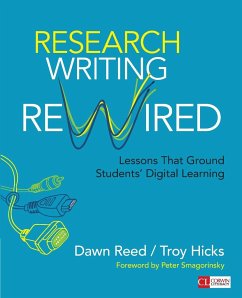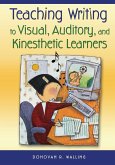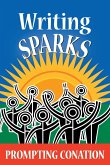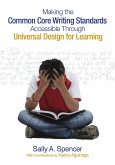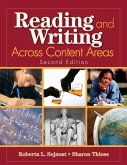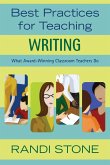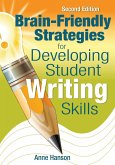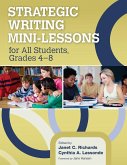- Broschiertes Buch
- Merkliste
- Auf die Merkliste
- Bewerten Bewerten
- Teilen
- Produkt teilen
- Produkterinnerung
- Produkterinnerung
Research shows that only half of teachers say digital tools make writing instruction easier... Research Writing Rewired shows us how to channel students' passion for digital communication into meeting our goals, and provides a vision for teaching English in today's classroom. The authors provide you with a clear model for tech-rich research that will inform your own units. Guiding components include: An inquiry-based, technology-rich unit 28 model lessons and a framework including extensions, tech tips, and activities Best practices on formative assessment, close reading, and think alouds…mehr
Andere Kunden interessierten sich auch für
![Teaching Writing to Visual, Auditory, and Kinesthetic Learners Teaching Writing to Visual, Auditory, and Kinesthetic Learners]() Donovan R. WallingTeaching Writing to Visual, Auditory, and Kinesthetic Learners32,99 €
Donovan R. WallingTeaching Writing to Visual, Auditory, and Kinesthetic Learners32,99 €![Writing Sparks Writing Sparks]() Corwin PressWriting Sparks13,99 €
Corwin PressWriting Sparks13,99 €![Making the Common Core Writing Standards Accessible Through Universal Design for Learning Making the Common Core Writing Standards Accessible Through Universal Design for Learning]() Sally A. SpencerMaking the Common Core Writing Standards Accessible Through Universal Design for Learning40,99 €
Sally A. SpencerMaking the Common Core Writing Standards Accessible Through Universal Design for Learning40,99 €![Reading and Writing Across Content Areas Reading and Writing Across Content Areas]() Roberta L. SejnostReading and Writing Across Content Areas44,99 €
Roberta L. SejnostReading and Writing Across Content Areas44,99 €![Best Practices for Teaching Writing Best Practices for Teaching Writing]() Randi StoneBest Practices for Teaching Writing29,99 €
Randi StoneBest Practices for Teaching Writing29,99 €![Brain-Friendly Strategies for Developing Student Writing Skills Brain-Friendly Strategies for Developing Student Writing Skills]() Anne HansonBrain-Friendly Strategies for Developing Student Writing Skills40,99 €
Anne HansonBrain-Friendly Strategies for Developing Student Writing Skills40,99 €![Strategic Writing Mini-Lessons for All Students, Grades 4-8 Strategic Writing Mini-Lessons for All Students, Grades 4-8]() Janet C. RichardsStrategic Writing Mini-Lessons for All Students, Grades 4-843,99 €
Janet C. RichardsStrategic Writing Mini-Lessons for All Students, Grades 4-843,99 €-
-
-
Research shows that only half of teachers say digital tools make writing instruction easier... Research Writing Rewired shows us how to channel students' passion for digital communication into meeting our goals, and provides a vision for teaching English in today's classroom. The authors provide you with a clear model for tech-rich research that will inform your own units. Guiding components include: An inquiry-based, technology-rich unit 28 model lessons and a framework including extensions, tech tips, and activities Best practices on formative assessment, close reading, and think alouds Activities built around students' favorite technology QR codes to video clips on a companion website
Hinweis: Dieser Artikel kann nur an eine deutsche Lieferadresse ausgeliefert werden.
Hinweis: Dieser Artikel kann nur an eine deutsche Lieferadresse ausgeliefert werden.
Produktdetails
- Produktdetails
- Verlag: Corwin
- Seitenzahl: 264
- Erscheinungstermin: 12. November 2015
- Englisch
- Abmessung: 235mm x 191mm x 14mm
- Gewicht: 500g
- ISBN-13: 9781483358987
- ISBN-10: 1483358984
- Artikelnr.: 43678931
- Herstellerkennzeichnung
- Books on Demand GmbH
- In de Tarpen 42
- 22848 Norderstedt
- info@bod.de
- 040 53433511
- Verlag: Corwin
- Seitenzahl: 264
- Erscheinungstermin: 12. November 2015
- Englisch
- Abmessung: 235mm x 191mm x 14mm
- Gewicht: 500g
- ISBN-13: 9781483358987
- ISBN-10: 1483358984
- Artikelnr.: 43678931
- Herstellerkennzeichnung
- Books on Demand GmbH
- In de Tarpen 42
- 22848 Norderstedt
- info@bod.de
- 040 53433511
Dawn Reed is an English teacher at Okemos High School in Okemos, Michigan and Co-Director of Red Cedar Writing Project at Michigan State University. She earned her MA in Rhetoric and Writing in Critical Studies in Literacy and Pedagogy from Michigan State University, and she continues to engage in teacher inquiry and research. Her research interests include the teaching of writing, digital literacy, and authentic writing opportunities, including writing for civic engagement. Through her work as a consultant with Red Cedar Writing Project, she is involved with supporting teacher professional development through work with schools and the National Writing Project. She has published in various journals and books, including English Journal and Teaching the New Writing: Technology, Change, and Assessment (Teachers College Press, 2009), and The Next Digital Scholar (2014) and on Digital Is (digitalis.nwp.org). Follow her @dawnreed.
At-a-Glance Lesson Summaries
Foreword by Peter Smagorinsky
Acknowledgments
Preface: Reading, Writing, and Inquiry With Adolescents
Why "Rewire" Research Writing?
The Contents of This Book
Our Guiding Principles
Introduction: Framing Student Inquiry
Considering Our Goals
The Big Picture: Broad Curricular Considerations
Additional Curricular Components
Final Considerations
Chapter 1. Introducing Research, Inquiry, and Connected Learning
Preview Lesson: Thinking Through a Cultural Lens
Lessons for Week 1
Lesson 1. Exploring Digital Identities
Lesson 2. Cultural Conversations Online: Joining Youth Voices and Reading
Collaboratively
Lesson 3. Beginning the Cultural Conversation
Lesson 4. Exploring Visual Culture Through Food Wrappers and Analyzing
Visual Culture
Lesson 5. Introducing Ethnography and the Culture Collage Assignment
Reflections on Embracing Inquiry in the Connected Classroom
Chapter 2. Getting Started With Inquiry Work: Visual Literacy and
Literature Circles
Lessons for Week 2
Lesson 6. Visual Literacy and Design
Lesson 7. Culture Collage Sharing
Lesson 8. Literature Circles
Lesson 9. Fashion and Image in American Culture
Lesson 10. Reading Images: Fact or Fiction?
Lesson 11. Personal Inquiry Reflections
Reflections on Mentor Texts for Analysis and Developing Inquiry Questions
Chapter 3. Laying the Groundwork for Research Writing: Developing Close
Reading Skills and Organizing Digital Spaces
Lessons for Week 3
Lesson 12. Literature Circle Meeting 1: Engaging in Active Discussions
Lesson 13. Self-Assessment and Reflection
Lesson 14. Language in American Culture
Lesson 15. Literature Circle Meeting 2: Close Reading of Passages
Lesson 16. Questioning and Speculating
Reflections on Developing Close Reading Skills and Organizing Digital
Spaces
Chapter 4. Embarking on the Inquiry-Based Research Essay: Collaboration,
Citation, and Credibility
Key Features of the Inquiry-Based Research Essay Assignment
Lessons for Week 4
Lesson 17. Literature Circle Meeting 3: Intertextual Connections
Lesson 18. Researching Skills and Tips: Exploring Sources
Lesson 19. Researching (Online and in the Library Media Center)
Lesson 20. Writing and Researching Workshop
Reflections on the Research Process
Chapter 5. Writing Workshop and Media Projects: Responding, Revising, and
Reflecting
Lessons for Week 5
Lesson 21. Literature Circle Meeting 4: Final Thoughts and Reflection
Lesson 22. Writing Workshop and Peer Response
Lesson 23. Media Work
Lesson 24. Cultural Questions and Media Literacy
Lesson 25. Workshop: Inquiry-Based Research Essay and Media Projects
Lesson 26. Reflection and Publication of the Inquiry-Based Research Essay
Lesson 27. Exploring Basic Copyright Issues: Copyright, Fair Use, Creative
Commons, and the Public Domain
Lesson 28. Reflecting, Sharing, and Celebrating the Final Media Project
Reflections on the Writing Process
Chapter 6. Final Reflections and Conclusions
Assessment: A Flexible, Rhetorical Approach
Purposeful Technology Integration
Conclusions
References and Further Reading
Index
About the Authors
Foreword by Peter Smagorinsky
Acknowledgments
Preface: Reading, Writing, and Inquiry With Adolescents
Why "Rewire" Research Writing?
The Contents of This Book
Our Guiding Principles
Introduction: Framing Student Inquiry
Considering Our Goals
The Big Picture: Broad Curricular Considerations
Additional Curricular Components
Final Considerations
Chapter 1. Introducing Research, Inquiry, and Connected Learning
Preview Lesson: Thinking Through a Cultural Lens
Lessons for Week 1
Lesson 1. Exploring Digital Identities
Lesson 2. Cultural Conversations Online: Joining Youth Voices and Reading
Collaboratively
Lesson 3. Beginning the Cultural Conversation
Lesson 4. Exploring Visual Culture Through Food Wrappers and Analyzing
Visual Culture
Lesson 5. Introducing Ethnography and the Culture Collage Assignment
Reflections on Embracing Inquiry in the Connected Classroom
Chapter 2. Getting Started With Inquiry Work: Visual Literacy and
Literature Circles
Lessons for Week 2
Lesson 6. Visual Literacy and Design
Lesson 7. Culture Collage Sharing
Lesson 8. Literature Circles
Lesson 9. Fashion and Image in American Culture
Lesson 10. Reading Images: Fact or Fiction?
Lesson 11. Personal Inquiry Reflections
Reflections on Mentor Texts for Analysis and Developing Inquiry Questions
Chapter 3. Laying the Groundwork for Research Writing: Developing Close
Reading Skills and Organizing Digital Spaces
Lessons for Week 3
Lesson 12. Literature Circle Meeting 1: Engaging in Active Discussions
Lesson 13. Self-Assessment and Reflection
Lesson 14. Language in American Culture
Lesson 15. Literature Circle Meeting 2: Close Reading of Passages
Lesson 16. Questioning and Speculating
Reflections on Developing Close Reading Skills and Organizing Digital
Spaces
Chapter 4. Embarking on the Inquiry-Based Research Essay: Collaboration,
Citation, and Credibility
Key Features of the Inquiry-Based Research Essay Assignment
Lessons for Week 4
Lesson 17. Literature Circle Meeting 3: Intertextual Connections
Lesson 18. Researching Skills and Tips: Exploring Sources
Lesson 19. Researching (Online and in the Library Media Center)
Lesson 20. Writing and Researching Workshop
Reflections on the Research Process
Chapter 5. Writing Workshop and Media Projects: Responding, Revising, and
Reflecting
Lessons for Week 5
Lesson 21. Literature Circle Meeting 4: Final Thoughts and Reflection
Lesson 22. Writing Workshop and Peer Response
Lesson 23. Media Work
Lesson 24. Cultural Questions and Media Literacy
Lesson 25. Workshop: Inquiry-Based Research Essay and Media Projects
Lesson 26. Reflection and Publication of the Inquiry-Based Research Essay
Lesson 27. Exploring Basic Copyright Issues: Copyright, Fair Use, Creative
Commons, and the Public Domain
Lesson 28. Reflecting, Sharing, and Celebrating the Final Media Project
Reflections on the Writing Process
Chapter 6. Final Reflections and Conclusions
Assessment: A Flexible, Rhetorical Approach
Purposeful Technology Integration
Conclusions
References and Further Reading
Index
About the Authors
At-a-Glance Lesson Summaries
Foreword by Peter Smagorinsky
Acknowledgments
Preface: Reading, Writing, and Inquiry With Adolescents
Why "Rewire" Research Writing?
The Contents of This Book
Our Guiding Principles
Introduction: Framing Student Inquiry
Considering Our Goals
The Big Picture: Broad Curricular Considerations
Additional Curricular Components
Final Considerations
Chapter 1. Introducing Research, Inquiry, and Connected Learning
Preview Lesson: Thinking Through a Cultural Lens
Lessons for Week 1
Lesson 1. Exploring Digital Identities
Lesson 2. Cultural Conversations Online: Joining Youth Voices and Reading
Collaboratively
Lesson 3. Beginning the Cultural Conversation
Lesson 4. Exploring Visual Culture Through Food Wrappers and Analyzing
Visual Culture
Lesson 5. Introducing Ethnography and the Culture Collage Assignment
Reflections on Embracing Inquiry in the Connected Classroom
Chapter 2. Getting Started With Inquiry Work: Visual Literacy and
Literature Circles
Lessons for Week 2
Lesson 6. Visual Literacy and Design
Lesson 7. Culture Collage Sharing
Lesson 8. Literature Circles
Lesson 9. Fashion and Image in American Culture
Lesson 10. Reading Images: Fact or Fiction?
Lesson 11. Personal Inquiry Reflections
Reflections on Mentor Texts for Analysis and Developing Inquiry Questions
Chapter 3. Laying the Groundwork for Research Writing: Developing Close
Reading Skills and Organizing Digital Spaces
Lessons for Week 3
Lesson 12. Literature Circle Meeting 1: Engaging in Active Discussions
Lesson 13. Self-Assessment and Reflection
Lesson 14. Language in American Culture
Lesson 15. Literature Circle Meeting 2: Close Reading of Passages
Lesson 16. Questioning and Speculating
Reflections on Developing Close Reading Skills and Organizing Digital
Spaces
Chapter 4. Embarking on the Inquiry-Based Research Essay: Collaboration,
Citation, and Credibility
Key Features of the Inquiry-Based Research Essay Assignment
Lessons for Week 4
Lesson 17. Literature Circle Meeting 3: Intertextual Connections
Lesson 18. Researching Skills and Tips: Exploring Sources
Lesson 19. Researching (Online and in the Library Media Center)
Lesson 20. Writing and Researching Workshop
Reflections on the Research Process
Chapter 5. Writing Workshop and Media Projects: Responding, Revising, and
Reflecting
Lessons for Week 5
Lesson 21. Literature Circle Meeting 4: Final Thoughts and Reflection
Lesson 22. Writing Workshop and Peer Response
Lesson 23. Media Work
Lesson 24. Cultural Questions and Media Literacy
Lesson 25. Workshop: Inquiry-Based Research Essay and Media Projects
Lesson 26. Reflection and Publication of the Inquiry-Based Research Essay
Lesson 27. Exploring Basic Copyright Issues: Copyright, Fair Use, Creative
Commons, and the Public Domain
Lesson 28. Reflecting, Sharing, and Celebrating the Final Media Project
Reflections on the Writing Process
Chapter 6. Final Reflections and Conclusions
Assessment: A Flexible, Rhetorical Approach
Purposeful Technology Integration
Conclusions
References and Further Reading
Index
About the Authors
Foreword by Peter Smagorinsky
Acknowledgments
Preface: Reading, Writing, and Inquiry With Adolescents
Why "Rewire" Research Writing?
The Contents of This Book
Our Guiding Principles
Introduction: Framing Student Inquiry
Considering Our Goals
The Big Picture: Broad Curricular Considerations
Additional Curricular Components
Final Considerations
Chapter 1. Introducing Research, Inquiry, and Connected Learning
Preview Lesson: Thinking Through a Cultural Lens
Lessons for Week 1
Lesson 1. Exploring Digital Identities
Lesson 2. Cultural Conversations Online: Joining Youth Voices and Reading
Collaboratively
Lesson 3. Beginning the Cultural Conversation
Lesson 4. Exploring Visual Culture Through Food Wrappers and Analyzing
Visual Culture
Lesson 5. Introducing Ethnography and the Culture Collage Assignment
Reflections on Embracing Inquiry in the Connected Classroom
Chapter 2. Getting Started With Inquiry Work: Visual Literacy and
Literature Circles
Lessons for Week 2
Lesson 6. Visual Literacy and Design
Lesson 7. Culture Collage Sharing
Lesson 8. Literature Circles
Lesson 9. Fashion and Image in American Culture
Lesson 10. Reading Images: Fact or Fiction?
Lesson 11. Personal Inquiry Reflections
Reflections on Mentor Texts for Analysis and Developing Inquiry Questions
Chapter 3. Laying the Groundwork for Research Writing: Developing Close
Reading Skills and Organizing Digital Spaces
Lessons for Week 3
Lesson 12. Literature Circle Meeting 1: Engaging in Active Discussions
Lesson 13. Self-Assessment and Reflection
Lesson 14. Language in American Culture
Lesson 15. Literature Circle Meeting 2: Close Reading of Passages
Lesson 16. Questioning and Speculating
Reflections on Developing Close Reading Skills and Organizing Digital
Spaces
Chapter 4. Embarking on the Inquiry-Based Research Essay: Collaboration,
Citation, and Credibility
Key Features of the Inquiry-Based Research Essay Assignment
Lessons for Week 4
Lesson 17. Literature Circle Meeting 3: Intertextual Connections
Lesson 18. Researching Skills and Tips: Exploring Sources
Lesson 19. Researching (Online and in the Library Media Center)
Lesson 20. Writing and Researching Workshop
Reflections on the Research Process
Chapter 5. Writing Workshop and Media Projects: Responding, Revising, and
Reflecting
Lessons for Week 5
Lesson 21. Literature Circle Meeting 4: Final Thoughts and Reflection
Lesson 22. Writing Workshop and Peer Response
Lesson 23. Media Work
Lesson 24. Cultural Questions and Media Literacy
Lesson 25. Workshop: Inquiry-Based Research Essay and Media Projects
Lesson 26. Reflection and Publication of the Inquiry-Based Research Essay
Lesson 27. Exploring Basic Copyright Issues: Copyright, Fair Use, Creative
Commons, and the Public Domain
Lesson 28. Reflecting, Sharing, and Celebrating the Final Media Project
Reflections on the Writing Process
Chapter 6. Final Reflections and Conclusions
Assessment: A Flexible, Rhetorical Approach
Purposeful Technology Integration
Conclusions
References and Further Reading
Index
About the Authors

